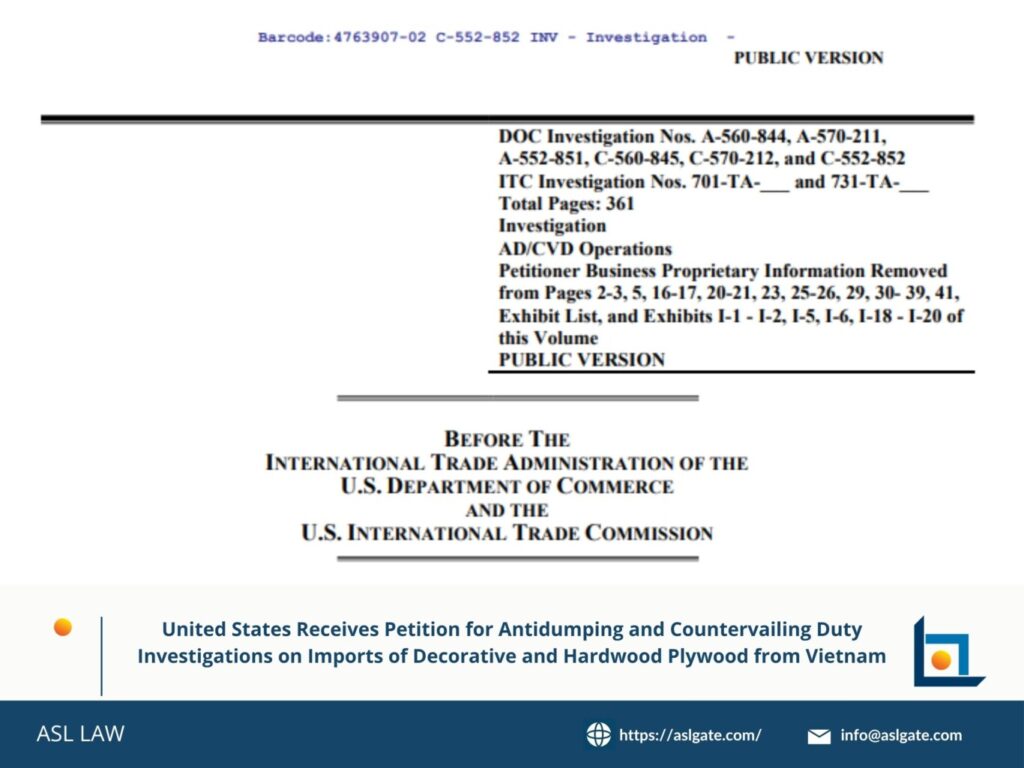On May 22, 2025, the U.S. Department of Commerce (DOC) officially received a petition requesting the initiation of antidumping (AD) and countervailing duty (CVD) investigations on imports of decorative and hardwood plywood from China, Indonesia, and Vietnam. The petition was filed by the Coalition for Fair Trade in Hardwood Plywood, alleging that imports from these three countries are causing or threatening to cause material injury to the U.S. domestic industry.
1. Preliminary Information
The product subject to the petition is decorative and hardwood plywood, primarily classified under HS codes 4412 and 9403. The petition, submitted on May 22, 2025, alleges that more than 130 exporters from Vietnam are engaging in dumping practices and receiving subsidies. Notably, the petition names several large companies, including Tekcom, Khang Dat Wood, Trieu Thai Son, and Thai Hoang.
The DOC has assigned case numbers A-552-851 (AD) and C-552-852 (CVD). The proposed period of investigation for dumping and subsidization is calendar year 2024, while the injury investigation period spans three years, from 2022 to 2024. According to data cited by the petitioner from the U.S. International Trade Commission (ITC), Vietnam’s plywood exports to the United States amounted to USD 401 million in 2022, USD 186 million in 2023, and USD 244 million in 2024, making Vietnam the second-largest exporter after Indonesia.
2. Allegations
2.1. Antidumping:
The alleged dumping margins for Vietnamese imports range from 112.33% to 133.72%, the lowest among the three countries under investigation. Since the U.S. does not recognize Vietnam as a market economy, dumping margins will be calculated using surrogate country values. The petitioner proposes Indonesia as the surrogate country, citing similarities in economic development and production structure. Interested parties have 60 days to submit comments regarding the selection of the surrogate country before the DOC issues its preliminary determination.
2.2. Countervailing Subsidies:
The petitioner alleges that Vietnamese exporters benefit from a total of 26 subsidy programs, grouped into seven main categories:
- Preferential credit: from state-owned commercial banks and the Vietnam Development Bank (VDB);
- Export and investment financing support;
- Corporate income tax incentives: including regional preferences, accelerated depreciation, and enhanced deductions;
- Import duty exemptions and refunds: for exporters, foreign-invested enterprises (FIEs), and companies located in industrial zones;
- Land use incentives: such as rent reductions or exemptions, and lower land and water use fees;
- Preferential utility pricing: reduced rates for electricity and water in industrial zones;
- Transnational subsidies: arising from imports of veneer from China at low prices due to Chinese government supply controls.
Although the petition does not specify the subsidy rates, it argues that these programs are causing serious injury to the U.S. domestic industry.
3. Investigation Procedure
The case will be jointly investigated by two U.S. agencies:
- DOC: responsible for examining dumping and subsidy practices and determining the imposition of duties;
- ITC: tasked with assessing injury to the U.S. domestic industry.
Duties will only be imposed if both DOC and ITC make affirmative determinations. The expected procedural timeline is as follows:
- By June 11, 2025: DOC to announce initiation decision (may be extended to 40 days);
- Within 45 days: ITC to issue preliminary injury determination;
- Within 140 days (AD) and 65 days (CVD): DOC to issue preliminary determinations;
- 75 days later: DOC to issue final determinations;
- 45 days later: ITC to issue final injury determination;
- Within 7 days after: DOC to issue duty orders, provided both determinations are affirmative.
4. Recommendations for Vietnamese Exporters
In light of the risk of AD and CVD duties, the Trade Remedies Authority of Vietnam advises plywood exporters to:
- Closely monitor the case developments and understand U.S. regulations and investigation procedures;
- Fully cooperate with U.S. investigating authorities to avoid being deemed non-cooperative;
- Register an IA ACCESS account via the DOC’s online portal to receive updates and submit required documents on time;
- Coordinate closely with the Trade Remedies Authority of Vietnam for technical and legal assistance throughout the proceedings.
To protect their legitimate interests, manufacturers and exporters should familiarize themselves with the procedure and actively contact Vietnamese law firms specializing in anti-dumping and trade remedy for timely assistance.
ASL Law is a leading full-service and independent Vietnamese law firm made up of experienced and talented lawyers. ASL Law is ranked as the top tier Law Firm in Vietnam by Legal500, Asia Law, WTR, and Asia Business Law Journal. Based in both Hanoi and Ho Chi Minh City in Vietnam, the firm’s main purpose is to provide the most practical, efficient and lawful advice to its domestic and international clients. If we can be of assistance, please email to [email protected].
ASL LAW is the top-tier Vietnam law firm for Anti-dumping & countervailing. If you need any advice, please contact us for further information or collaboration.

 Tiếng Việt
Tiếng Việt 中文 (中国)
中文 (中国) 日本語
日本語

